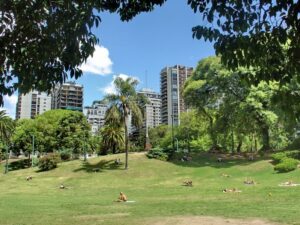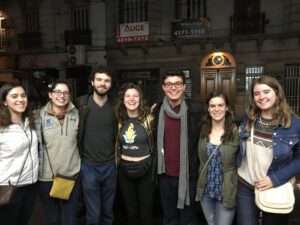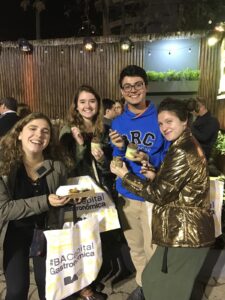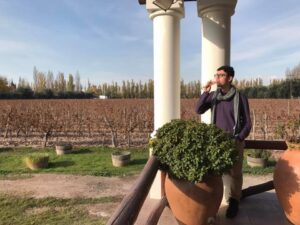The Quest for Tranqui



It was the second week of orientation. My friend Allie and I were sitting in ParqueBarrancas de Belgrano, one of the many green spaces in Buenos Aires.
Barrancas is a grassy hill peppered with trees, where locals sit around drinking mate, throw around a frisbee, or play with their dogs. Allie and I sat there drinking pear juice. We stared at the sky. We were absolutely restless. “I just want classes to start,” I would say. “I know, I don’t know what to do with all this free time,” Allie would respond.

The most difficult part about adjusting to Argentine culture was learning to relax. I come from a small liberal arts college where I embody many roles. When I left for Argentina, I had been Student Body Vice President, an officer for my service fraternity, Alpha Phi Omega, a member of several student-faculty committees, a student worker at the school archives, and an intern for a campaign. On top of this, I was taking 20 credit hours, the maximum for my school. This may seem like overload, but it was a typical semester for me at IC. I had been similarly involved since my freshman year. Even in high school, I was extremely involved, engaging in numerous extracurriculars and participating only in advanced placement courses. I am a busy-body.
Argentina was thus a huge culture shock. A word you will often hear come out of the mouth of Argentines is “tranqui.” Short for “tranquilo,” it means calm. Relax. Chill. No phrase in the Spanish language better defines Argentines. In the street they walk slowly, appreciating their surroundings. At work, they do not stress about overperforming. If stress and anxiety exist in Argentina, it was not very visible. Most people took a laid-back approach to life, your average Argentine does not worry extensively about the small things. If they are late to an event, “tranqui.” If they encounter a small deterrence, “tranqui.” If you are struggling to meet a deadline, “tranqui.”

The principles of punctuality, high expectations, and the Protestant work ethic we hold ourselves to in the United States were not readily on display. This was an adjustment. I had been used to being extremely involved back in the United States, working non-stop from the time I woke up to the time I went to bed. In Argentina, I did not have the same obligations. I was taking five classes and doing an internship, but they only met once a week. My classes met on generally on the same days, so I was only truly busy three days a week. In general, there was not a lot of homework either. I had very long weekends and a lot of free time in my week. By default, I learned that I would have to learn to become tranqui.
At first, this was difficult. I was anxious and restless. I wanted to find ways to fill my days but that was hard to do when I had so much free time. It was also frustrating when there were strikes that would make me late to class and appointments. It was frustrating when a professor never showed up on time to class. It was frustrating to deal with seemingly incompetent bureaucracies, either when traveling or getting visa paperwork filled out. I was stressed out about all this time on my hands and the fact that nobody in the country seemed to find anything wrong.

What I began to do was explore the city, travel, sit in parks and read. I got used to the idea of free time. At times, I would tell myself to walk slower and appreciate my surroundings like I saw the Argentines around me do. Most days, if I had nothing better to do, I would call Allie or other people in my program and we would sit on the patio of our favorite ice cream shop, eat ice cream, and relax. Once I became comfortable, I also decided I could start meeting local people. I had time to go on dates for the first time in what felt like forever. I was able to sit around and just think about my personal life, my future, my goals without having to worry about anything else. I took time for myself and my health and I felt stress free and happy. I was tranqui.
One of the things I most valued from my study abroad was the ability to reflect about the life I wanted to live. I decided that upon my return, I would stop overcommitting so that I had time for myself. Easier said than done. While I did commit to less things, I took on a lot of responsibility in the things I was committed to. I got a taste of tranqui, but came back to the same habits. As a result, my health has suffered. As I reflect on the challenges of returning from study abroad, the high demand that our culture has ingrained us to live up to is difficult to come back to. If Argentina taught me anything, it is that in the United States we are overzealous about our responsibilities. While I know I can meet high demand, I also know that if I want to live my best and healthiest life, I need to take time for myself.
If you are reading this and are also finding it difficult to readjust to the pace of our culture again, here are five tips straight from Buenos Aires to consider:

- Schedule personal time: pencil it in your schedule. Do not allow anyone or any task to intrude on your personal time. Use it to sit down and think, or exercise, or do something you love.
- Walk slow: until you’re in a city full of people who stroll casually, you do not realize how fast Americans walk. It is like we are always in a rush even when we do not have anywhere to be. Walk slow. Appreciate your surroundings. Begin to notice what is happening all around you.
- Evaluate your priorities: if you feel overwhelmed with all the tasks that you have upon return, perhaps it is time to reassess your priorities and choose to only do what is most important to you.
- Be honest – express to your colleagues, professors, or other people that rely on you the difficulties of readjusting. When people understand what you are going through, they will be better able to help you readjust and support you.
- When you are happy and healthy, your work, whether professional or academic, improves. You understand how to make time for things and you are not overly stressed about having to do a hundred things at once. I’m still on my own path to achieve tranqui, but I am improving every day.
Christian F. | Illinois College | Argentine Universities Program in Buenos Aires, Argentina | Spring 2017